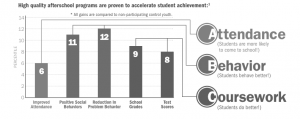
When it comes to improving education in Arkansas, there are so many choices. Some want more arts programs, or maybe more individual mentorship. Others think kids would benefit from more exposure to science, technology, engineering, and math. One proven alternative takes all those into account: quality after-school and summer programs.
Believe it or not, there is no dedicated state funding for these programs. The after-school and summer programs we have in Arkansas are the result of dedicated program staff, teachers, parents, and administrators who cobble together grants, private donations, and their volunteer time to make them work. They do this because they know how important high-quality programs are to increasing student achievement.
It’s time the Arkansas Legislature acknowledged this fact and put our tax dollars where our educational values are: funding after-school and summer programs.
Since 2005, the Arkansas Out of School Network (AOSN) and its partner organizations have been working to support and expand quality after-school and summer programs in Arkansas. The goal is to create a dedicated state revenue stream to fund programs that are aligned with existing quality standards and best practices as set forth in the Youth Development Grant Program Act {166} of 2011. Unfortunately, the program has never been funded. It would require an appropriation in the amount of $5 million to fund high-need areas of the state, creating a kind of pilot project to show how useful these partnerships can really be.
It’s worth it. For every dollar spent in quality after-school and summer programs, our communities receive $9 in return, while at the same time protecting and sustaining our investments in early learning. Quality after-school and summer programs:
- Keep children safe. Parents know this. In Arkansas, 74 percent of parents agreed in a poll that after-school programs help young people avoid risky behaviors, reducing crime, drug use and the likelihood of teen parenthood. Nine in 10 parents said they choose after-school programs because they are safe havens.
- Support working families. In Arkansas, 79 percent of parents agree that after-school programs help working parents keep their jobs, in part because they have peace of mind about their children.
- Inspire children to learn. Arkansas students attending 21st Century Community Learning Centers (after-school and summer programs funded with federal grants) are showing gains in school attendance, grades, standardized test scores and behavior. Four out of five students in 2013 summer programs maintained reading levels, as indicated in pre- and post-program assessments.
- Establish workforce habits. The programs offer opportunities to learn about careers and participate in internships. In Arkansas, 63 percent of parents agree that after-school programs help children gain workforce skills like teamwork, leadership, and critical thinking.
- Reduce juvenile crime. The hours between 3 and 6 p.m. are when the majority of juvenile crime occurs, and when children are most at risk of committing or becoming a victim of a crime. After-school and summer programs offer positive adult role models, engaging activities, and healthy alternatives that keep kids focused.
There is a real demand for these programs. According to a national study conducted by the After-school Alliance in 2014, 45 percent of Arkansas children in grades K-12 would be enrolled in an after-school or summer programs if one were available to them. Only 13 percent participate now. One of the top barriers was the cost of the programs.
Quality programs yield results. Researchers Durlak and Weissberg found that programs adhering to the SAFE model yielded greater results (SAFE = Step-by-step training approach, Active Learning, Focused on skill development, Evidence-based practices). Young people participating in programs that follow these practices showed marked improvement in attendance, behavior, and coursework.
Durlak & Weissberg, Collaborative for Academic, Social and Emotional Learning; Expanding Minds, p. 196
If we ever expect for our kids to have a learning space that gives them necessary skills to go on to college, become entrepreneurs, and enter the workforce, we need to fund the Positive Youth Development Act now.

